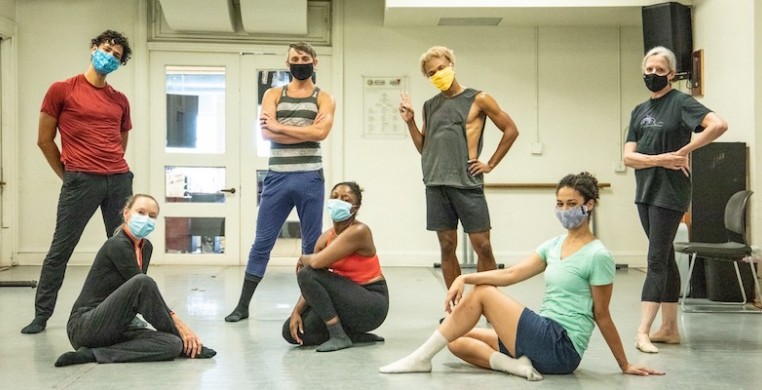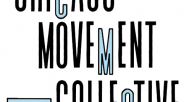What started out as a selfish endeavor turned into something wonderful: an all-inclusive training space with a collection of some of Chicago’s finest dance teachers and affordable pricing. The Chicago Movement Collective (CMC) may have been born out of necessity but has the potential to redefine a crucial part of the city’s arts scene. “The idea started back in March when COVID-19 first hit and studios were closing down,” CMC founder Ethan Kirschbaum said. “I lost a lot of work. I wondered how I was going to make up those lost classes. Basically, how do I cover my own ass?”
With time on his hands, Kirschbaum began to construct a plan for himself and found his intentions and purpose expand. The Black Lives Matter movement, coupled with pandemic uncertainty, had him feeling overwhelmed. The adage ‘think globally, act locally’ came to mind and sparked a desire “to help shift the dynamic and help disassemble systemic racism in our society” and an idea, which ultimately became CMC. “I realized I needed to look in my own backyard and my backyard is the dance studios of Chicago,” said Kirschbaum. “Of course, we want to change everything from the ground up, but I wanted to find a very practical, tactile way that I could affect positive change.” He reached out to studios, students, friends and teachers and found a plethora of people eager to help. Pro bono legal and public relations aid, a website builder, someone to run social media and an impressive lineup of teachers came together organically. “It blossomed into something bigger than me,” Kirschbaum said. “It was my idea to reach out to all these artists, but by no means did I do this by myself. I’m a reflection of this group.”
CMC, which opened its figurative doors at the American Rhythm Center (ARC) in the Fine Arts Building on Michigan Avenue on Sept. 8, boasts a roster of teachers including ballet heavy hitters Birute Barodicaite and Patti Eylar, along with former artists from companies like Giordano Dance Chicago, Hubbard Street Dance Chicago, Mad Shak, Muntu Dance Theater of Chicago, River North Dance Chicago and Urban Bush Women, to name a few. These artists have been around a while and have multitudes of experience to relay to the next generation. Daily class schedules—there are a total of 26 classes each week—list the usual suspects of ballet, modern and jazz, while adding other genres of Latin jazz, Afro-Cuban and most-interestingly, something called Animal Flow. That’s the point—to be diverse. “It’s for all dancers,” said Kirschbaum. “The word ‘all’ is so tricky, but I truly mean it. It’s for all races, body types, gender expressions, sexual orientation… It’s a home for everyone.”
With the best intentions set, how do you insure inclusivity? How is this collective different from other studios? “The institution I’m trying to build has never been in Chicago. It’s been absent,” Kirschbaum said. “We wanted to start with representation from artists of color, multiple cultures and racial identities at the front of the room. It’s important for artists to see themselves choreographing, running a studio, being in charge. We want to attract you because you like what we’re doing and you see yourself in this space and in these instructors.” For example, most hip-hop dancers face the conundrum of have to choose between training with classes only taught in the evenings or teaching those same evening classes. CMC offers advanced training during the day allowing artists to train and still pay the bills. Another example: Depending on what company you dance with, hip-hop artists may not be considered professional dancers at every school or studio. Those dancers cannot get the discounted professional rate, making them pay more for the same classes as their peers. “It’s those micro-aggressions that need to be mended,” Kirschbaum said. CMC hopes to level the playing field making sure training is affordable and available to everyone. The current pricing structure is $15 for a drop-in class, a $10 professional rate and only $5 to take classes virtually. “Again, I want it to be a home for all dancers. My goal is to continue to live that by example, not just talk about it. I want to put it into practice and hopefully inspire other studios to be inclusive and open.”
Added to the mix is the Claire Bataille Legacy Program coming in 2021. Established by Kirschbaum with the blessing of the late Bataille’s two sons and Lou Conte, it is a paid scholarship program based on the Lou Conte scholarship program that Conte and Bataille founded in 1984. Artists will send a letter of intent and present a solo (either in person or online) in whatever genre they choose. If chosen, they will work with Kirschbaum to establish the perfect, customized schedule and track for their artistic and professional goals.
When asked what CMC looks like five years from now, Kirschbaum pauses to think. “Honestly, this was a short-term goal for me. I wanted to get back into the studio, back to my community. If this lasts six weeks, six months or six years, it’s a success to me. But a long-term goal would be to have satellite or partner studios around the city. Not everyone can make it to the Loop every day. We need to go where the dancers are and not make them come to us.”


